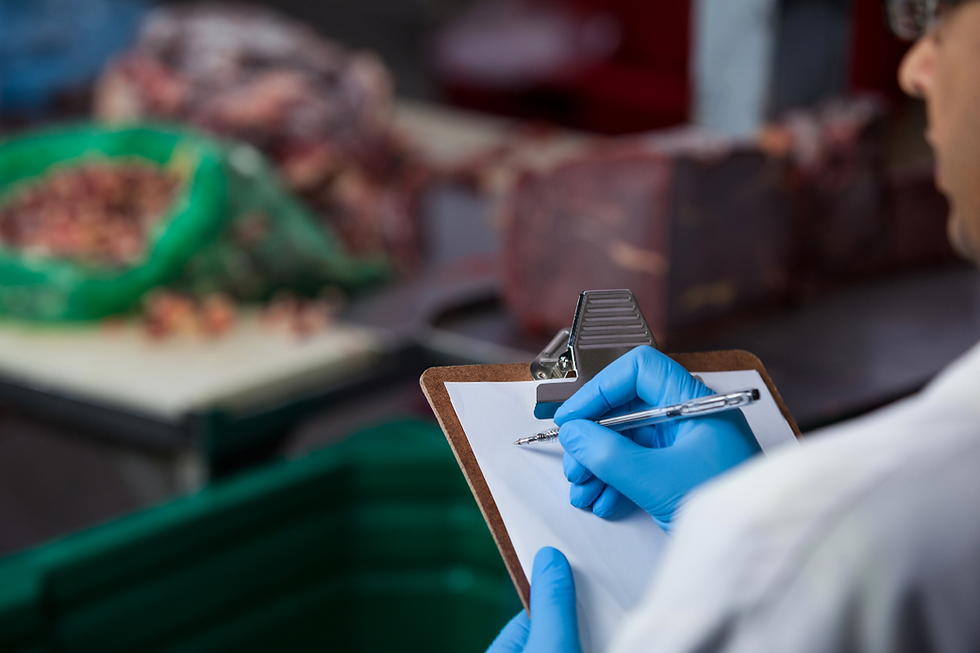Medical Waste Management Challenges & Solutions: How Technology is Transforming the Industry
- Sam Spaccamonti

- May 29, 2025
- 4 min read
Medical waste management isn’t just a regulatory obligation—it’s a critical safeguard for public health and environmental sustainability. From contaminated syringes to chemotherapy residues, improperly handled medical waste can spread infections, pollute ecosystems, and trigger costly legal penalties. Yet, healthcare facilities and waste transporters worldwide grapple with systemic challenges that undermine safety and efficiency.
The stakes are higher than ever:
15% of medical waste is hazardous, yet up to 30% is mismanaged due to poor segregation.
During COVID-19, India’s medical waste surged to 656 tons/day, overwhelming existing infrastructure.
Non-compliance fines can exceed $70,000 per violation in the U.S., with reputational damage compounding losses.
In this deep dive, we’ll explore the most pressing challenges in medical waste management and how innovative solutions—particularly SaaS platforms like Octopus SaaS—are revolutionizing the industry.

The Top 5 Medical Waste Management Challenges (and How to Solve Them)
1. Inadequate Waste Segregation
The Problem: Mixing infectious waste (e.g., blood-soaked gauze, sharps) with general trash is alarmingly common. This cross-contamination increases treatment costs by up to 40% and heightens infection risks for workers and communities.
The Solution:
Use color-coded smart bins with sensors to alert staff about incorrect disposal.
Implement AI-powered waste categorization tools that analyze waste types via image recognition.
Integrate staff training modules into workflow software to ensure compliance.
How Octopus SaaS Helps: Octopus’s Smart Manifest System automates waste classification at the source. Drivers using the OCTO Field App scan waste containers, which are instantly categorized and logged into compliant digital manifests. Real-time alerts notify supervisors of segregation errors, reducing contamination risks by 90%.
2. Outdated Treatment Infrastructure
The Problem: Many regions lack adequate treatment facilities. India, for example, treats only 640 tons/day of its 1,590-ton capacity, forcing rural clinics to resort to unsafe practices like open burning.
The Solution:
Establish decentralized treatment hubs using autoclaves and microwave disinfection.
Use route optimization software to connect remote facilities with underutilized plants.
Invest in waste-to-energy systems to monetize non-recyclable waste.
How Octopus SaaS Helps: Octopus’s AI-Driven Routing identifies the nearest available treatment facility and calculates the most fuel-efficient path. Its Marketplace Module lets transporters collaborate with third-party processors, ensuring no waste is stranded. During the pandemic, this feature helped Indian transporters reduce disposal delays by 65%.
3. Regulatory Non-Compliance
The Problem: Biohazard labeling errors, missing manifests, and incomplete sterilization records are common pitfalls. Manual tracking leaves facilities vulnerable to audits and lawsuits.
The Solution:
Use automated compliance dashboards that track permits, training, and disposal certificates.
Implement blockchain-based audit trails for tamper-proof record-keeping.
Deploy real-time GPS tracking of waste from pickup to final disposal.
How Octopus SaaS Helps: Octopus’s Unified Compliance Hub auto-generates EPA, OSHA, and state-specific reports. Its GPS-enabled fleet tracking provides regulators with verifiable proof of proper disposal, slashing audit preparation time by 80%.

4. Inefficient Logistics & Rising Costs
The Problem: Inefficient routes and manual scheduling lead to wasted fuel, overtime labor costs, and missed pickups. Transporters spend 35% of their time on administrative tasks instead of core operations.
The Solution:
Use dynamic route optimization that adjusts for traffic, weather, and urgent pickups.
Automate invoicing tied to waste volume and service completion.
Apply predictive analytics to forecast waste generation trends.
How Octopus SaaS Helps: Octopus’s AI Routing Engine reduces fuel costs by 22% and improves on-time pickups to 98%. Its Billing & Accounting Suite auto-generates invoices based on GPS-verified service completion, cutting payment delays by 50%.
5. Pandemic Preparedness
The Problem: COVID-19 exposed fragile waste systems. Soaring PPE waste overwhelmed landfills, while vaccine vial disposal created new bottlenecks.
The Solution:
Use emergency response modules to manage sudden waste surges.
Employ PPE waste trackers to prioritize high-risk materials.
Build supplier networks for rapid access to extra bins and trucks.
How Octopus SaaS Helps: During the Delta variant surge, Octopus’s OCTO Connect feature enabled brokers to instantly subcontract overflow waste to available transporters, preventing treatment gridlocks. Its Waste Processing Module helped facilities track vaccine waste separately, ensuring safe, compliant disposal.
Octopus SaaS: The All-in-One Platform Solving Medical Waste Chaos
While point solutions address individual challenges, Octopus SaaS is the first end-to-end platform designed by medical waste experts to unify every operational facet. Here’s why it’s becoming the industry’s gold standard:
AI Route Optimization: Reduces fuel costs by 22% and daily route planning time from 2 hours to 15 minutes.
Smart Manifests: Automates 100% of documentation, eliminating manual errors.
Real-Time GPS Tracking: Provides regulators with indisputable disposal proof.
OCTO Field App: Empowers drivers with digital manifests, signatures, and stop alerts.
Compliance Hub: Auto-files reports for EPA, OSHA, DOT, and state agencies.
Marketplace: Connects 1,200+ transporters with suppliers and processors.
The Future of Medical Waste Management
The industry is shifting toward predictive, preventive, and participatory waste management:
IoT-enabled bins that signal when they’re full.
Carbon footprint dashboards to track sustainability goals.
AI risk predictors to flag facilities prone to violations.
Platforms like Octopus SaaS are spearheading this evolution by turning reactive workflows into proactive, data-driven strategies.
Ready to Transform Your Waste Operations?
Medical waste management doesn’t have to be a costly, chaotic burden. With Octopus SaaS, you gain:
90% faster compliance reporting
35% lower operational costs
100% audit-ready documentation
Schedule a Free Demo and see how Octopus SaaS can streamline your medical waste operations in under 10 minutes.
Join 500+ transporters and healthcare providers who’ve already turned waste management from a liability into a competitive advantage.
By confronting these challenges head-on with cutting-edge technology, the medical waste industry isn’t just mitigating risks—it’s paving the way for a safer, greener, and more efficient future. The question isn’t whether to modernize your approach, but how quickly you can act.




Comments